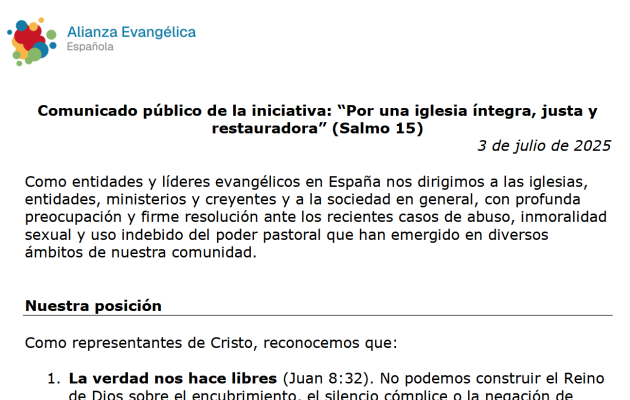More than 100 churches and mission organisations, as well as 140 Christian leaders, have signed a document backed by biblical references calling for an end to the culture of silence. Meanwhile, stories of abuse are being shared on social media.
![An image from the video testimony of a woman recounting the harassment she suffered at the hands of an evangelical pastor in Spain, published on 28 July 2025. / Image: [link]Seneca Falls on YouTube[/link].](https://cms.evangelicalfocus.com/upload/imagenes/68948828dbf94_WhatsAppImage2025-08-07at12.58.03Cropped.jpg) An image from the video testimony of a woman recounting the harassment she suffered at the hands of an evangelical pastor in Spain, published on 28 July 2025. / Image: [link]Seneca Falls on YouTube[/link].
An image from the video testimony of a woman recounting the harassment she suffered at the hands of an evangelical pastor in Spain, published on 28 July 2025. / Image: [link]Seneca Falls on YouTube[/link].
Evangelical churches in Spain have opened a public debate that had been dormant until cases of sexual abuse and abuse of power by well-known leaders came to light. Some of these cases are still unresolved.
Secular media have reported extensively on judicial investigations into sexual abuse of several minors in at least two churches, one in Terrassa and another in Valencia.
In April, the president of the Spanish Evangelical Alliance, Marcos Zapata, and the executive secretary of the Federation of Evangelical Religious Entities of Spain, Carolina Bueno, explained their views on situations that have shaken the evangelical world in two interviews published in English on this site on this site.
In early July, a group of evangelical leaders from different evangelical denominations and organisations published a manifesto in favour of breaking the culture of silence to ensure ‘just, honest and restorative’ churches.

[photo_footer] The manifesto by several evangelical leaders in Spain published by the Spanish Evangelical Alliance on 3 July 2025. [/photo_footer] Based on Psalm 15 and other biblical texts, it calls for bringing to light injustices committed by spiritual leaders, not putting the reputation of churches or evangelical organisations ahead of justice for victims, and understanding the spiritual dimension of spiritual coercion.
The text, which Evangelical Focus reported on in more detail here, also calls for the drafting of protocols for action in situations of potential abuse of power, the creation of safe spaces for victims, and a commitment to justice and real transparency before any restoration process.
In the first month after the manifesto was published, 61 evangelical churches and 46 evangelical missions or organisations in Spain requested formal adherence to the statement. These come from Pentecostal, Charismatic, Baptist, Brethren and independent backgrounds.
In addition, 144 pastors and leaders of evangelical organisations from all corners of Spain have signed the manifesto in a personal capacity.
Also in June and July 2025, several women published testimonies of humiliation, verbal violence, and double lives in Spanish evangelical churches through the evangelical platform Seneca Falls.
The testimony with the greatest impact was that of a young woman of foreign origin who, in an anonymous video with her voice distorted, recounts the harassment she suffered at the hands of an unnamed evangelical pastor.
For 30 minutes, she explains how he contacted her from the first day she visited the church, and how constant messages via social media and personal messaging, mixed with pastoral counselling and Bible verses, led to a 10-month romantic and sexual relationship. She also recounts her depression and doubts about her faith after feeling abandoned. The testimony has been viewed over 20,000 times on YouTube in one week.
Amidst all this public conversation, at least a dozen of users on Instagram and other social media platforms have said they suffered some kind of abuse in the context of evangelical churches.
Other users have expressed their disagreement with speaking publicly about ‘private sins,’ expressing their fear that cases that are made public will damage the witness of evangelical churches in Spain's society, where often negative stereotypes about evangelicals are still repeated by the media.
In recent weeks, entities such as the Evangelical Alliance and La Voz de Agar (The Voice of Hagar), a support group for women abused in church contexts, have published content to help identify sexual harassment by people in positions of spiritual authority and have called for transparent investigations into allegations that have arised.
A specific contact email address has also been set up to offer anonymous support to potential victims, which, according to sources at La Voz de Agar, has already been used by several women.
In Spain, a pioneering guide to preventing spiritual abuse was published in 2016, and the recommendations of renowned evangelical psychiatrist Pablo Martínez also sought to raise awareness among churches about the need to identify patterns of abusive behaviour.
Public evangelical initiatives against abuse have also been launched recently in France, Switzerland and Italy. In countries with a longer evangelical tradition, such as England, Germany and the Scandinavian countries, there are also independent bodies that professionally investigate allegations against religious leaders.
[analysis]
[title]Join us to make EF sustainable[/title]
[photo][/photo]
[text]At Evangelical Focus, we have a sustainability challenge ahead. We invite you to join those across Europe and beyond who are committed with our mission. Together, we will ensure the continuity of Evangelical Focus and our Spanish partner Protestante Digital in 2025.
Learn all about our #TogetherInThisMission initiative here (English).
[/text][/analysis]

Las opiniones vertidas por nuestros colaboradores se realizan a nivel personal, pudiendo coincidir o no con la postura de la dirección de Protestante Digital.
Si quieres comentar o